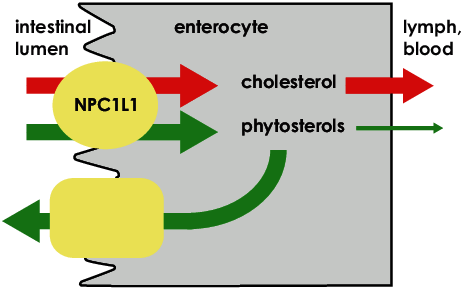Cardiovascular risk from phytosterols
Contrary to initial expectations, studies in recent years have shown that increased phytosterol levels in the blood increase the risk of cardiovascular diseases. According to a study from the University of Munster, high phytosterol values tripled the likelihood of a heart attack in high-risk coronary patients (Assmann et al., 2006). These research results are highly significant, as some foods (e.g. certain kinds of margarine) are artificially enriched with phytosterols in order to lower the cholesterol level and thus prevent atherosclerosis.
Phytosterols lower cholesterol levels
Vegetable sterols occur in nature in fatty fruits, nuts and oils. Their chemical structure is related to that of cholesterol. In the human body, phytosterols and cholesterol compete for the same absorption mechanism from the intestine: That is why cholesterol absorption decreases if increased quantities of phytosterols are taken up with the food. This occurs in particular through nutrition with certain types of margarine, which are artificially enriched with phytosterols.
Gene variants increase phytosterol levels and cardiovascular risk
Certain gene polymorphisms cause phytosterols to be resorbed particularly efficiently from the intestine and at the same time to increase the risk for cardiovascular diseases significantly (Teupser et al., 2010). A polymorphism in the gene region of transport molecules that carry phytosterols from the enterocytes back into the intestinal lumen (ABCG5, ABCG8) is responsible for the increased phytosterol absorption. Another relevant polymorphism is in the AB0 blood group, which is why people with blood type 0 have a lower risk.
Diagnostic tests
Carriers of the gene polymorphisms rs4245791 (ABCG5-/ABCG8-gene region) and rs657152 (AB0 gene) increase their cardiovascular risk with a diet with phytosterol-enriched food, rather than lowering it. We therefore recommend an examination of the genotype prior to any dietary changes. The genetic analysis is conducted in the laboratory using polymerase chain reaction and sequencing. Since rs657152 is linked to blood type, blood group affiliation can be included in the evaluation instead of this gene polymorphism if so indicated on the test request form.
Sample material
2 mL EDTA blood.
A declaration of consent is required under the gene diagnostics law.
Transport of the blood sample to the laboratory is not time critical and can be done by mail. For genetic testing, we require the signed consent of the patient.For further questions please contact us by phone at 030 77001 220.
Literature
- Assmann et al. (2006): Plasma sitosterol elevations are associated with an increased incidence of coronary events in men: results of a nested case-control analysis of the Prospective Cardiovascular Münster (PROCAM) study. Nutr Metab Cardiovasc Dis. 16: 13-21.
- Teupser et al. (2010): Genetic regulation of serum phytosterol levels and risk of coronary artery disease. Circ Cardiovasc Genet. 3: 331-339.
- Weingärtner et al. (2008): Vascular Effects of Diet Supplementation With Plant Sterols. J Am Coll Cardiol. 51: 1553-1561.

